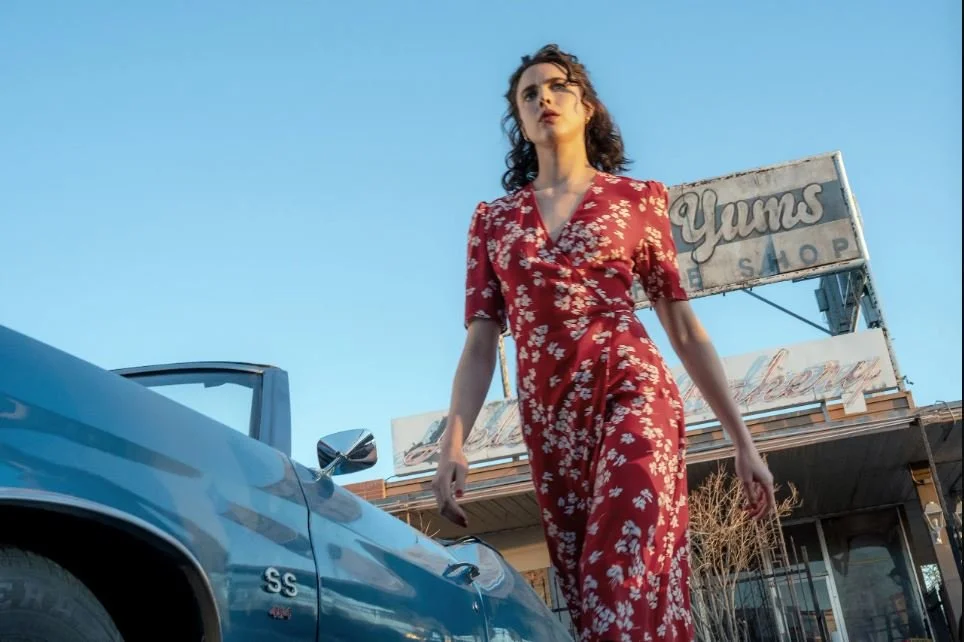‘Honey Don’t!’ Film Review
by William Lindus
Ethan Coen’s Honey, Don’t! is the sort of film that begins as a shrug and ends as a smirk, a shaggy noir comedy that feels equal parts throwback and reinvention. After his solo debut with Drive-Away Dolls, Coen’s follow-up is less about subject matter continuity and more about refining a tonal signature: dusty genre scaffolding propped up by irreverent humor, horny character work, and a half-sincere, half-parodic interest in the misfits who wander through small-town crime stories. The result is something endearingly lopsided—a movie that doesn’t always know where it’s going but seems delighted to stumble there anyway.
At the center of the chaos is Margaret Qualley, who gives a performance that feels like it could spin off into a dozen sequels without breaking a sweat. Her Honey O’Donahue is a mess of contradictions: a whiskey-gulping, bed-hopping private eye whose rakish charm borrows the posture of classic gumshoes but filters it through the sweaty thrill of sapphic lust. Coen and Qualley lean into the absurdity of the conceit—this hardboiled archetype with a lipstick lesbian twist—and instead of reducing Honey to gimmickry, they make her feel alive, unpredictable, and deeply funny. It’s a star turn that doesn’t just hold the film together but practically dares it to collapse around her, knowing she can carry the rubble.
If Honey is the storm, Aubrey Plaza is the eye at its center. She plays a police officer stuck with paperwork and evidence logs, the kind of drab functionary usually left out of these stories. But when she tumbles into Honey’s orbit—and into her bed—the movie begins to flirt with something resembling a love story. Plaza does what Plaza does best: droll, tightly coiled line readings that contrast beautifully with Qualley’s manic looseness. Their scenes together crackle not just with erotic tension but with an odd tenderness, as if each is surprised to find themselves wanting more than a one-night stand. It’s the closest Honey, Don’t! comes to sincerity, and it’s enough to give the film a heartbeat.
But even the liveliest characters can’t fully compensate for a script that feels as though it was stitched together on the back of a cocktail napkin. Coen’s scene-by-scene writing still sparkles—snappy dialogue, absurd digressions, a knack for letting actors linger on punchlines—but the larger narrative shape is messy at best. Honey’s investigation wanders aimlessly, circling around a subplot involving Chris Evans as a local evangelist-turned-cult leader. Evans is game, playing against type as a grinning menace, but his thread doesn’t weave into the main plot until so late that it registers more as afterthought than revelation. The film has the rhythm of a shaggy dog story without quite earning the charm of one.
What saves Honey, Don’t! from unraveling is its refusal to take itself too seriously. The movie seems aware that its scaffolding is flimsy, so it leans into vibes instead of precision. The pleasure comes less from the mystery itself than from the detours: Honey waking up in unfamiliar beds, Plaza’s officer learning to loosen her grip, Qualley grinning through hangovers like they’re badges of honor. It’s a film about enjoying the company of its characters, even if the case they’re chasing barely holds together.
That looseness is both bug and feature, and it points to the larger question of what Ethan Coen is doing in this late-career solo era. Honey, Don’t! feels less like a definitive statement than an experiment—a sketch for a recurring character, a genre riff that could blossom into something sturdier with time. Honey O’Donahue may not yet have the elegance of Benoit Blanc, but she has the spark of a character who could anchor her own series, if only given sharper material. Coen clearly relishes playing with pulp tropes, but he’ll need to tighten his grip if he wants the films themselves to stand as more than curious diversions.
Still, for all its structural mess, Honey, Don’t! is hard to dismiss. It’s funny, it’s sexy, and it’s carried on the shoulders of a lead performance that makes you wish the movie around her were as good as she is. Maybe it’s not the fully formed reinvention of Ethan Coen as a solo filmmaker. But it’s a messy, horny, slyly charming step in that direction—a reminder that sometimes the fun of a noir isn’t in solving the mystery, but in getting lost with the wrong people along the way.
3 out of 5 Bear Paws


